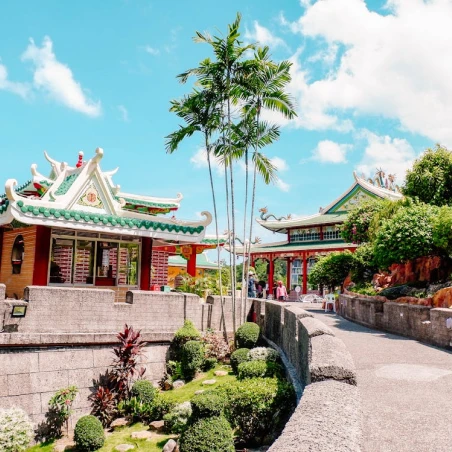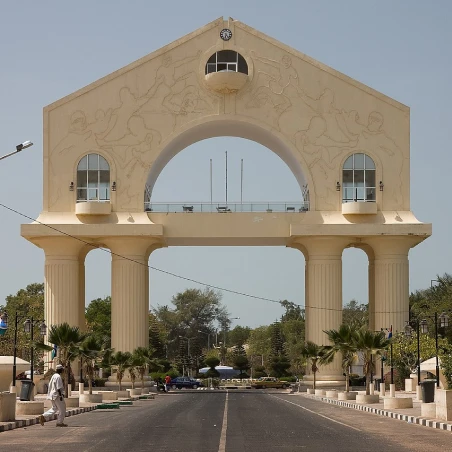Table of Contents:
- What is the average cost for a trip to Thailand?
- How much money do you need per day in Thailand?
- What is a daily budget for a budget traveler?
- What is a daily budget for a mid-range traveler?
- What is a daily budget for a luxury traveler?
- How much do flights to Thailand cost?
- What are the accommodation costs in Thailand?
- How much does food and drink cost in Thailand?
- What are the transportation costs within Thailand?
- How much should you budget for activities and sightseeing?
- How does the season affect your Thailand vacation cost?
- How do travel costs vary by region in Thailand?
- How can you stay connected affordably in Thailand?
- What are other expenses to budget for a Thailand trip?
- What is the cost of living for a long-term stay in Thailand?
What is the average cost for a trip to Thailand?
The average cost of a trip to Thailand depends heavily on your travel style, meaning Thailand can fit almost any budget. According to travel cost data, a typical traveler's budget of around $100 (around ฿3,400) per day usually covers accommodation, food, local transport, and sightseeing. To help with planning, here are some average trip costs:
- One week (for two): $1,400 (around ฿47,600)
- Two weeks (solo): $1,400 (around ฿47,600)
- Two weeks (for two): around $2,800 (around ฿95,200)
- One month (solo): around $3,000 (around ฿102,000)
- One month (for two): around $6,000 (around ฿204,000)
Of course, these numbers change depending on how you like to travel. A 7-night budget trip might range from $900 to $1,300, while a mid-range holiday costs between $1,400 and $2,400. For a luxury stay, expect to pay over $4,000, with daily expenses starting as low as $35 and exceeding $250 per person.
How much money do you need per day in Thailand?
On average, travelers spend about $92 (around ฿3,100) per person per day in Thailand, but your spending habits can easily change that number. This amount typically covers accommodation, meals, local transportation, and some activities. For example, data from travel budgeting sites shows that travelers spent an average of ฿481 ($14) on food and ฿384 ($11) on local transport per day.
Daily budgets vary by travel style:
- Budget traveler: $20–$40 per day for basic necessities.
- Mid-range traveler: Around $100 per person for greater comfort.
- Luxury traveler: $300+ per day for high-end hotels, fine dining, and private tours.
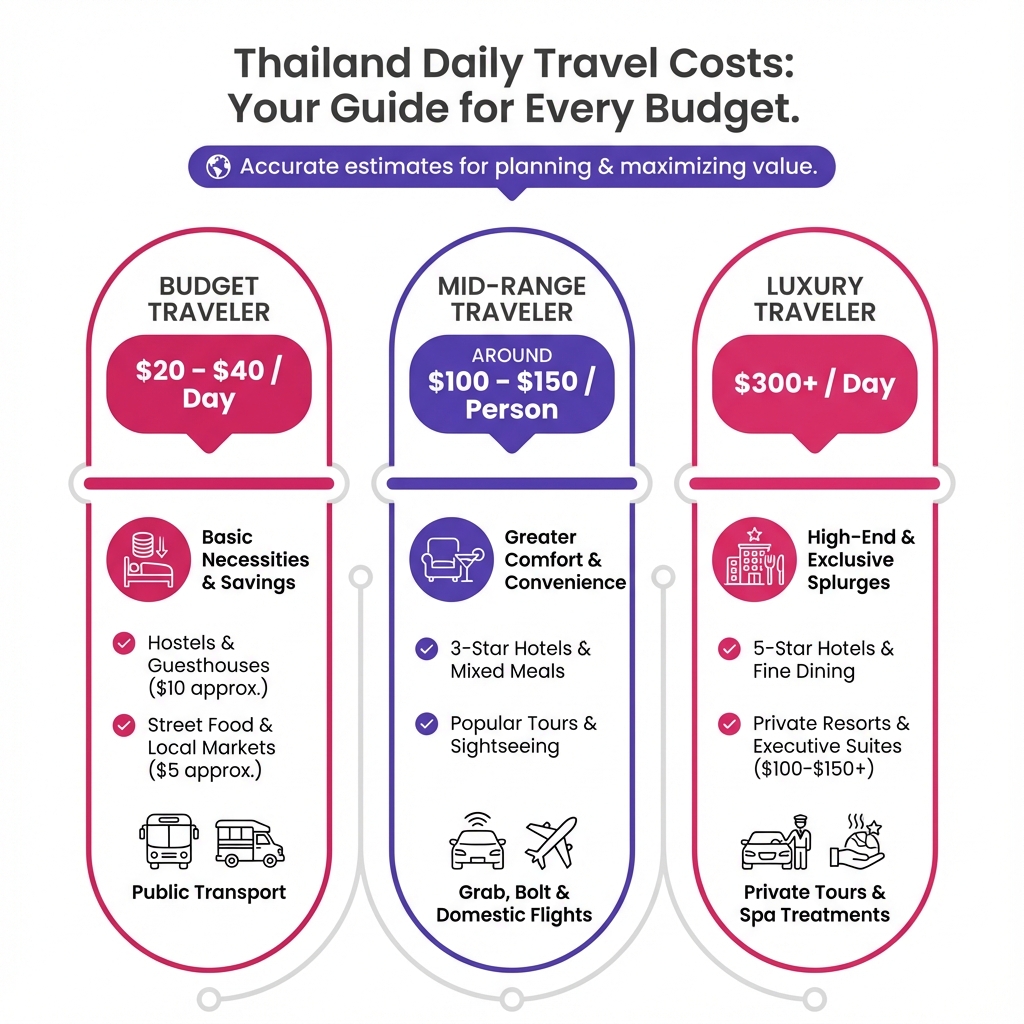
What is a daily budget for a budget traveler?
A budget traveler in Thailand can expect daily expenses to range from $20 to $40. You can achieve this by saving money on:
- Accommodation: Staying in hostels or guesthouses can cost around $10 per night.
- Food: Relying on street food and local markets keeps food expenses as low as $5 for the day.
- Local Transport: Using public transportation, such as local buses and songthaews, minimizes travel costs.
While many backpackers get by on just $25 a day, here's a little pro-tip: bumping your budget to around $36 allows for a private room and meals, with about $10 left for activities.
What is a daily budget for a mid-range traveler?
A mid-range traveler in Thailand should plan for a daily budget of between $100 and $150 (3,300 to 5,000 baht) per person. This budget affords a comfortable trip, covering 3-star hotels and a mix of meals. It also allows for popular tours, sightseeing, and convenient transport options like Grab, Bolt, or domestic flights for longer journeys.
What is a daily budget for a luxury traveler?
A luxury traveler in Thailand can expect daily expenses to start at $200–$300, with costs rising for truly top-tier splurges. This budget covers 5-star hotels or private resorts, where rooms alone can cost $100-$150 per night. It also includes fine dining, private transport, and exclusive activities like private tours or spa treatments. Destinations such as Phuket and Koh Samui are perfect for this travel style, often with higher prices for nightlife and alcohol.
How much do flights to Thailand cost?
Expect your international flights to Thailand to be the single largest expense in your travel plan. Airfare can swing dramatically based on your departure location, the time of year, and how far in advance you book. For travelers from the US West Coast (e.g., LAX, SFO), a round-trip economy ticket typically costs $700 to $1,000. These prices can dip to $600 for a sale fare in the low season or climb above $1,200 during peak times.
To find the best deals, book flights during the shoulder season (April–June, September–October) or low season (July–October). This helps you avoid the peak tourist rush and major holidays. Travelers from major European hubs like London, Paris, or Frankfurt can often find round-trip fares in the €600–€900 range, with prices varying by carrier and season. As a rule of thumb, and this is a big one, booking at least three to five months in advance often unlocks the best fares, especially if you plan to travel during peak season.
What are the accommodation costs in Thailand?
Accommodation is usually the second-largest part of your travel budget, after flights. Budget travelers find the most affordable options in hostels and guesthouses, with private rooms costing $10 to $30 per night. A clean mid-range hotel generally runs from $30 to $70. For luxury seekers, high-end hotels and resorts start at $100–$150 per night and can go much higher.
Location and season also affect prices. Accommodation in popular destinations like Bangkok, Phuket, Koh Samui, and Koh Phi Phi are more expensive than in northern cities like Chiang Mai. Hotel and resort costs also increase during the high season (November to February) and decrease during the low season.
How much does food and drink cost in Thailand?
Food and drink costs in Thailand are very affordable, making daily expenses easy to manage. You'll be amazed at how far your money goes here. Eating street food is a great way to save money, with meals costing as little as 50 Thai Baht (about $1.50). You can easily budget just $5–$15 per day by eating at street stalls and local restaurants. Dining at mid-range or Western-style restaurants will increase your food costs to levels often comparable with Western countries.
Drinks are also affordable. A bottle of water costs 5 Baht or more, and refilling stations are available. But alcohol can quickly drive up your budget, especially during nightlife outings. Local beers like Chang or Leo cost around 39-59 Baht per bottle, but imported spirits and wine are significantly more expensive.
What are the transportation costs within Thailand?
Getting around Thailand is diverse and generally affordable, with daily local travel averaging around 384 baht ($11) per person. For longer distances, domestic flights offer speed and convenience, with a round-trip ticket from Bangkok to cities like Chiang Mai costing about $100 per person. More budget-friendly choices for intercity travel include overnight trains and buses, which also help save on accommodation costs; for instance, a bus ticket from Bangkok to Pattaya is about $6 to $10. Within cities, public transportation is the most economical option. Bangkok's BTS Skytrain and MRT subway systems are efficient and inexpensive, while other areas have local buses and songthaews (shared pickup trucks). For shorter trips, you can use tuk-tuks (be sure to negotiate fares beforehand—and trust me on this one) or ride-hailing apps like Grab and Bolt. On the islands, renting a scooter for about $5 a day is popular, but be sure you have a valid license. Airport transfers can range from $15–$60 for a shared minivan to $30–$100 for a private taxi.
How much should you budget for activities and sightseeing?
Your budget for activities and sightseeing depends entirely on your interests. Many cultural sites like temples and museums are affordable, with entrance fees from $1 to $10, and some are even free. However, more structured experiences like a cooking class, a visit to an ethical elephant sanctuary, or island hopping tours will cost more, generally between $30 and $100.
Specialized activities can be one of your biggest expenses. For example, scuba diving around Koh Tao or Koh Phi Phi is a major expense, especially if you are pursuing certification. Watching a Muay Thai match is another popular option. Your budget should also account for nightlife, as costs for bars and clubs can add up quickly, particularly with alcohol. A combination of sightseeing, such as visiting temples, Sealife Bangkok, and a cruise, can cost around $240.
How does the season affect your Thailand vacation cost?
Your vacation cost is greatly affected by the season you travel in, with prices for flights and accommodation fluctuating with tourist demand and weather. The high season runs from November to February, offering the best weather but also the highest prices and largest crowds. On the other hand, the low season, or green season, from May to August coincides with the rainy season. Traveling then means lower costs and fewer tourists, though the weather can be a drawback.
You'll find a good balance during the shoulder seasons (March-April and September-October). These periods offer moderate prices, pleasant weather, and smaller crowds. Booking during these times is a great way to save money, as flight and accommodation costs tend to drop. This seasonal pricing is more pronounced in popular destinations like Phuket and Koh Phi Phi.
How do travel costs vary by region in Thailand?
Where you travel in Thailand dramatically shapes your budget, with popular islands often costing significantly more than the northern provinces. Major cities, popular islands, and the northern provinces all have different price points. Cities like Bangkok and famous islands such as Phuket, Koh Samui, and Koh Phi Phi are generally more expensive. Expect to pay more for accommodation, food, and transportation in these high-demand locations.
On the flip side, Northern Thailand, especially Chiang Mai, is known for its lower cost of living. It's one of the most budget-friendly destinations for travelers. Keep in mind the mainland-island price gap; mainland expenses can be up to 50% cheaper. For the lowest travel costs, explore smaller towns, inland provinces, and less-touristy islands.
How can you stay connected affordably in Thailand?
Staying connected in Thailand is easy and affordable. The best strategies involve local options instead of expensive international roaming. Purchasing a local SIM card is a cheap and easy option, available upon arrival at the airport or a 7-Eleven. A prepaid SIM with data and calls can cost as little as $10 for a month, with some plans offering 5 GB of data for around 150 baht.
For even greater convenience, an eSIM is an even easier option than physical SIM cards, allowing you to set up your phone for internet access before you even land. For maximum convenience, consider a dedicated eSIM card for Thailand, which provides instant activation upon arrival. Besides a prepaid data plan, you can save data by using the free Wi-Fi that's common in hotels, cafes, and some public spaces.
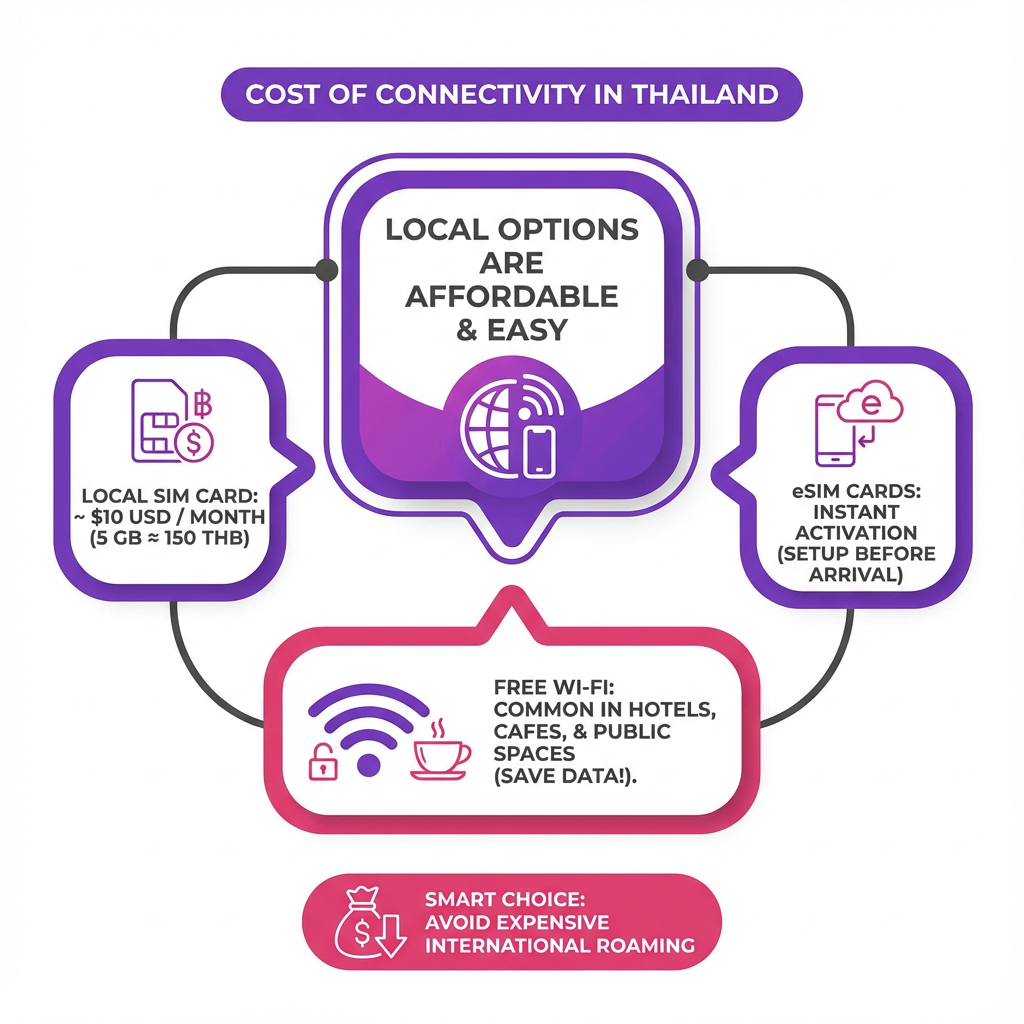
What are other expenses to budget for a Thailand trip?
Beyond the main travel costs, you'll also need to factor in some extra costs to avoid hidden fees. Visa fees are a potential expense. According to the Royal Thai Embassy, many travelers, including U.S. passport holders, may get a free 30-day visa exemption on arrival, but you should always verify current rules before traveling. Getting travel insurance is a smart move to cover medical emergencies, cancellations, and lost luggage.
ATM fees can add up. Use a fee-free debit card or make fewer, larger cash withdrawals to cut down on fees. Don't forget to budget for personal items like souvenirs and tips, as well as practical costs like laundry, toiletries, and medications. It's wise to set aside an extra 10-15% of your total trip budget for these miscellaneous costs, or simply budget a flexible $15-$30 per day, depending on your shopping and tipping habits.
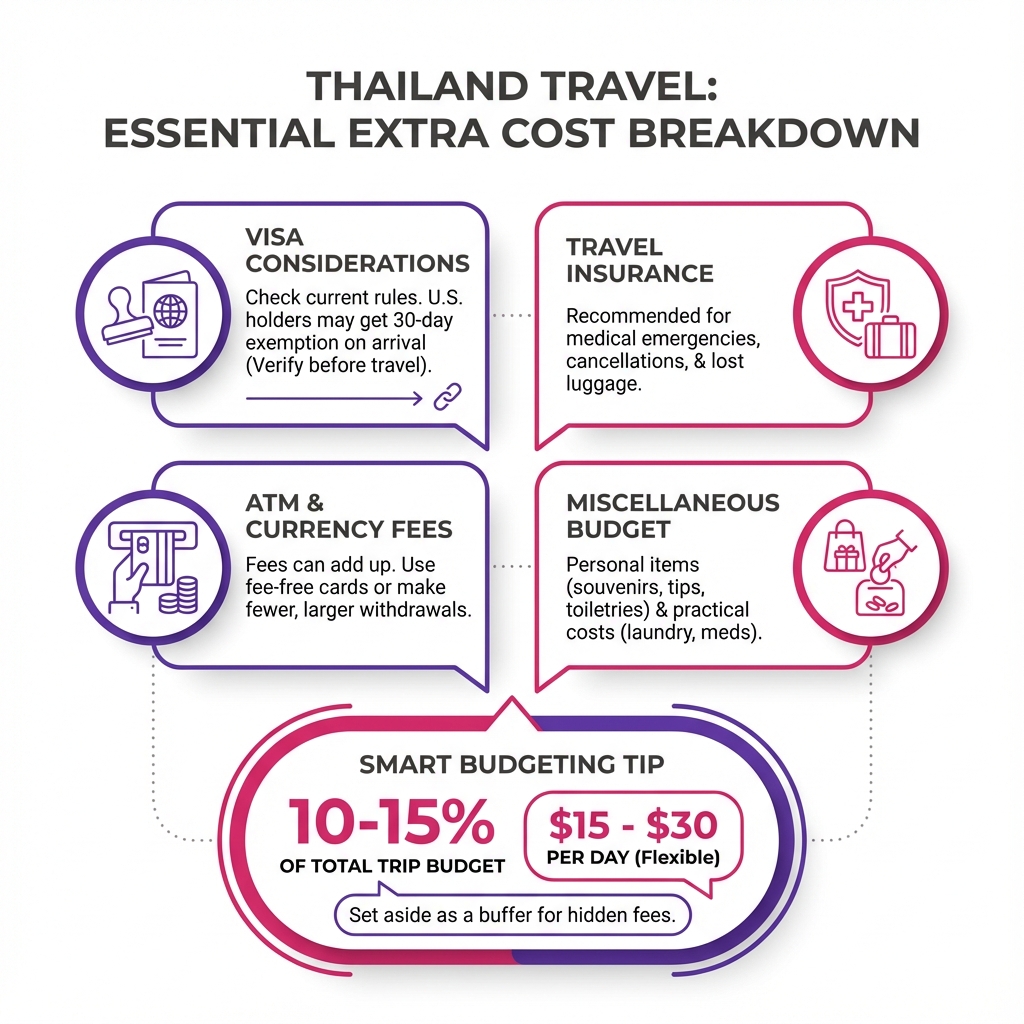
What is the cost of living for a long-term stay in Thailand?
Thailand's affordable cost of living makes it a popular destination for expats and retirees planning a long-term stay, with monthly expenses varying by lifestyle and location. While a basic budget can start around $700, a more comfortable lifestyle costs about $1,000 a month, and luxury living in Bangkok can range from 90,000 to 150,000 THB. Your main expenses will be housing, food, transportation, and healthcare.
Choosing a city like Chiang Mai over Bangkok can significantly lower your housing and daily costs. You'll also need to think about visa requirements. For instance, the retirement visa and the Long-Term Resident (LTR) Visa have specific financial thresholds. Budgeting for international health insurance is essential, too. A comfortable year with good private healthcare and housing can range from $18,000 to over $30,000.
Sources
Posts you might also like


